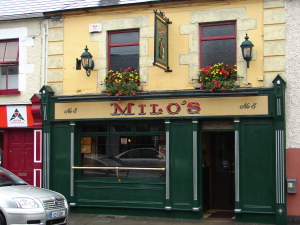Ireland was booming when I visited early in 2008. And the property crash was just around the corner. My accommodation was the swanky Chief O’Neill’s Hotel. It was part of the grand local commercial, residential and cultural development in Smithfield village. Now O’Neill’s is that melancholy haunt, the budget Generator Hostel. The once bustling Smithfield village (still host to the biannual horse fair) is a poster child for the dangers of untrammelled property speculation: empty apartments and unfinished commercial buildings abound. Right next door to the Generator is the tottering Jamison’s Distillery Tower, now closed for safety concerns. I wish I’d visited it when I’d had the chance. Ah well. Today the place is booming again (is there a pattern here…?) Anyway I’m looking forward to taking my son back next year so he can check out his Irish heritage.

Dubliners say ‘sorry’ and ‘you’re very welcome’ with startling frequency, and ‘thanks a million’ almost as often. They’re friendly and unpretentious folk – It’s almost like being at home, plus charming accents. It’s certainly true that both places – New Zealand and Ireland – are small. Dublin has about the same population as Auckland, a history packed country you can drive most anywhere in a day, whose principal export – people – has ensured much of the world want to visit it, so feeding that principal industry – tourism.
My driver in on the airport bus, Conor, was a ninth generation Dubliner. He dropped in and out of Gaelic, as sundry locals got on and off, and proudly told me that he had been fluent as a child, and was equally proud that all his children had the native tongue. He showed me an umbrella shop, once owned by a distant ancestor, where a gate from the original city wall had been excavated. He pointed out the Viking side of the river Liffey, and the Celtic side, and the spot in between called Black Pool: translated as Duhb Lin, but pronounced Dove Lin – which of course the English got wrong. If they’d bothered to ask any local at the time he’d have set them right. Or worse he might have suggested the complete Gaelic explanation, ‘ford at the confluence of river and sea.’ Which is rather a mouthful so all round, concluded Conor charitably, they were better off with the mispronounced Duhb Lin.
Did anyone follow that?
You can get this information out of any brochure, but there’s a cheap explorer’s sense of discovery to be had in discovering it by accident. I also got to hear juicy tit-bits such as about Conor’s daughter, who’d just come back after 10 months in New Zealand – she’d have stayed longer except that her ‘drip’ of a boyfriend had decided to join her, so she cut the trip short to get free of him.
You won’t find that in the standard Dublin tourist guides.
My English hotel experience had been all dripping faucets, peeling paint, and inedible breakfasts with cold coffee served promptly to your table. Fortunately many re-runs of Faulty Towers had prepared me for this, and I coped with the cheerful third world inefficiency and wounded indifference in the face of complaint. Chief O’Neill’s in Smithfield village, Dublin, couldn’t be more different. Just six years old, the Hotel is styly, the staff are all smiles, it has a fine resident jazz duo, and a Spartan but pleasing functionality to the rooms: exposed stainless steel plumbing, much like the boiler room of the Titanic might have looked before it hit that iceberg in 1912. Or was it? A doco I saw on Irish TV on my first night tried to convince me – crippled by a crazed Fenian’s bomb? Perhaps an early inspiration to present day Al-Qaeda terrorists, the alleged bomber went down with the ship. So we’ll never know…
O’Neill’s is right next to the District court, and round the corner in the local pub you can rub shoulders with lawyers and the criminals they represent – two classes of thieves, and ample reason to keep a firm hold on your wallet.
But no fear of bombings here in Southern Ireland anyway. As on the English tube there were unhurried reminders on the airport intercoms to stay near your luggage. If you strayed too far you risked your duty free whisky and cigarettes might be tragically detonated by a lumbering robotic explosive device. But the war for a free state ended a long time ago, and peace has broken out with the IRA who – if incredulous reports are to be believed – have handed in all their stocks of bombs and weapons. The old Republicans, De Valera and Collins, live on only in vague memory, as street names and statues well-fertilised by pigeons. Now all anyone cares a tinker’s toss about is having a laugh, a good life – and making money.
 Dublin might lack London’s human variety, but it sure made up for it on the telly. My first night’s viewing also included the doco 49UP: which saw a London cabby happily ensconced in the Spanish Riviera – ironically now much more like the England he understood than the present-day East End he grew up in (except for the weather), overrun now with Poles. To underline the point the superb movie Sexy Beast followed, where a retired to Spain Cockney hood is harried into one last job by right nutter Ben Kingsley. Earlier a news item showed Irish farmers gleefully extracting sunflower oil and refining it into gasoline, and praying the price for petrol would stay high so they might actually make a profit out of it. But even if they don’t they could work out an EU subsidy to turn a pound – or Euro, which the Irish converted to a year or so back. On the drive from the airport a sign by some road works proclaimed a motor-way development 85% funded out of EU coffers. The Irish have been on the winning end of such subsidies for decades, and long the fastest growing economy of Europe, they’re still happily riding the gravy train. From all public buildings the National and EU flags hang side by side in equal eminence – the EU flag with it’s circle of stars bearing more than a passing resemblance to the Confederate banner of the American Civil war.
Dublin might lack London’s human variety, but it sure made up for it on the telly. My first night’s viewing also included the doco 49UP: which saw a London cabby happily ensconced in the Spanish Riviera – ironically now much more like the England he understood than the present-day East End he grew up in (except for the weather), overrun now with Poles. To underline the point the superb movie Sexy Beast followed, where a retired to Spain Cockney hood is harried into one last job by right nutter Ben Kingsley. Earlier a news item showed Irish farmers gleefully extracting sunflower oil and refining it into gasoline, and praying the price for petrol would stay high so they might actually make a profit out of it. But even if they don’t they could work out an EU subsidy to turn a pound – or Euro, which the Irish converted to a year or so back. On the drive from the airport a sign by some road works proclaimed a motor-way development 85% funded out of EU coffers. The Irish have been on the winning end of such subsidies for decades, and long the fastest growing economy of Europe, they’re still happily riding the gravy train. From all public buildings the National and EU flags hang side by side in equal eminence – the EU flag with it’s circle of stars bearing more than a passing resemblance to the Confederate banner of the American Civil war.
The Irish attitude is of course in marked contrast to some of the other nations of Europe who are paying for it all. The French, past supporters of the EEC more perhaps by virtue of fears of US world dominance, have voted recently against granting the European Parliament wider powers. The Germans are struggling just to afford East Germany’s integration, and the English are worried about their loss of sovereignty as European integration proceeds. A recent case where EU safety standards declared the standard British battle tank vibrationally unsafe is a case in point. The English also shake their heads at the busloads of Latvians daily arriving to eagerly take up all the low paid menial and hospitality jobs. Which is odd, given that English don’t really want them. Waves of immigrations since the 60’s – from Pakistan, Jamaica, and now Eastern Europe – means they haven’t had to for quite a while.
One consequence is that at times just meeting any Englishman as a tourist in Central London is cause for astonishment – unless you happened (as I did) to trip over one in the gutter the morning after the colossal past Ashes win celebrations (you’d think they’d never won anything before). Attractions in London as diverse as St Paul’s and my local South Kensington café, Milano, are staffed by Romanian arrivals not much more recent than myself. Between my unfamiliar Kiwi accent and their English as a second – or even third language – communication becomes a challenge. Yet while the people change, the English way of life – bad food, class divisions and the schizoid celebration and denigration of ostentatious achievement, personified in the frenzied Ashes win celebrations and the daily terror attacks on celebrities in the tabloids – seems on the face of it utterly unthreatened. ‘Spence,’ the soon to be disgraced rags to riches African immigrant success story, with his pin-stripe suits and lousy tennis back-hand, is a sign of the times. From Council flat to dodgy property multi-millionaire, he is the self-made British capitalist with the stunning Polish wife, who could be behind the Nigerian bank internet rip-off scam that has snared many gullible Kiwis the last year…